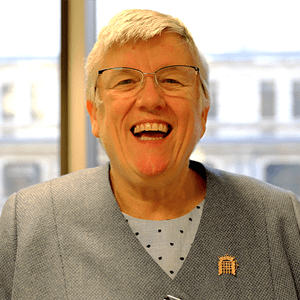Baroness Stedman-Scott OBE was appointed as a Parliamentary Under Secretary of State at the Department for Work and Pensions in 2019 and was appointed to the UK Government’s Equality Hub in 2021. The Equality Hub is part of the Cabinet Office and includes the Government Equalities Office, the Disability Unit, the Race Disparity Unit and the Social Mobility Commission. Baroness Stedman-Scott was chief executive of Tomorrow’s People Trust between 2005-2015 and has also worked for the Salvation Army.

“Knowing what someone has previously earned is likely to prejudice employers when they set out to negotiate; and could mean that a new starter’s salary isn’t based on their skills and experience, as it obviously should be.”
Pay Transparency Pilot
It’s great to take part in Womanthology again after featuring in your International Women’s Day issue. I won’t repeat my last introduction, which can be found here, but I was delighted to be invited back to share more detail about our new Pay Transparency Pilot.
Creating clear expectations
Your readers will recall that on International Women’s Day I launched a new Pay Transparency Pilot to find out the best way to support employers in showing more salary information on their job adverts. I also asked participating employers to put a stop to asking for salary history.
Evidence shows that when salary information is not clear, this impacts how people negotiate and causes more inequality in their earnings. On top of this, research tells us that women and ethnic minorities are less likely to negotiate starting salaries and pay rises than men and majority groups. This also results in lower starting salaries and smaller pay rises once in a job where salaries are not transparent.
One simple way employers can prevent these disparities is by providing salary information in all of their job adverts, and not asking about previous salary during recruitment.

In order to support employers to make these changes, we intend to work with them to develop a methodology that will enable them to establish and publish salary ranges for all roles in their organisation. We will then get businesses to pilot using this methodology in order to fully understand the impact of listing salary information.
Strengthening negotiating power
When people are asked to disclose previous salary it can weaken their negotiating power when they start a new job and continue previous inequalities. It effectively opens the door to people being undervalued throughout their careers.
Knowing what someone has previously earned is likely to prejudice employers when they set out to negotiate; and could mean that a new starter’s salary isn’t based on their skills and experience, as it obviously should be.
Research by the Fawcett Society found that asking about prior salary can also damage the confidence of women going into negotiations, further impacting their ability to broker for fair pay.
Empowering and enabling
Gender pay gap reporting has opened up discussions about fairness in the workplace. However, we recognise more broadly that reducing the gap is not something that employers are able to fix on their own.
The root causes of the gap, for example men and women entering into different sectors and occupations, requires broader action, which is why the Government is currently focused on widening opportunity in higher-paying sectors.
One thing that work on the gender pay gap has brought into focus, is the public’s interest in understanding whether their own pay is fair, and the empowering and enabling force information about pay can be!
Reducing the national gender pay gap
The national gender pay gap has fallen significantly under this government — and by about a quarter in the last decade. This is huge.
The reporting regulations have helped to motivate employers, and focus attention on improving equality in the workplace. It’s been great to see employers and staff gaining an understanding of what the gender pay gap is, and what it looks like in their own organisation.
It’s also been really encouraging to see employers taking positive steps which should not only help to close the gap, but also have wider benefits for the whole workforce. For example, many have looked to improve transparency and reduce bias in their processes (like pay and reward).
Our recent calls around salary at the recruitment stage are all part of the same story; ultimately fair and transparent processes are absolutely key to positive change. I look forward to seeing this pilot evolve and finding out how we can help support businesses and job applicants best.





